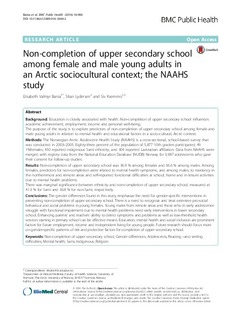| dc.contributor.author | Bania, Elisabeth | |
| dc.contributor.author | Lydersen, Stian | |
| dc.contributor.author | Kvernmo, Siv | |
| dc.date.accessioned | 2016-09-28T12:46:30Z | |
| dc.date.accessioned | 2016-09-29T14:32:04Z | |
| dc.date.available | 2016-09-28T12:46:30Z | |
| dc.date.available | 2016-09-29T14:32:04Z | |
| dc.date.issued | 2016 | |
| dc.identifier.citation | BMC Public Health 2016, 16(960) | nb_NO |
| dc.identifier.issn | 1471-2458 | |
| dc.identifier.uri | http://hdl.handle.net/11250/2412064 | |
| dc.description.abstract | Background: Education is closely associated with health. Non-completion of upper secondary school influences
academic achievement, employment, income and personal well-being.
The purpose of the study is to explore predictors of non-completion of upper secondary school among female and
male young adults in relation to mental health and educational factors in a socio-cultural, Arctic context.
Methods: The Norwegian Arctic Adolescent Health Study (NAAHS) is a cross-sectional, school-based survey that
was conducted in 2003–2005. Eighty-three percent of the population of 5,877 10th graders participated; 49.
1%females, 450 reported indigenous Sami ethnicity, and 304 reported Laestadian affiliation. Data from NAAHS were
merged with registry data from the National Education Database (NUDB) Norway for 3,987 adolescents who gave
their consent for follow-up studies.
Results: Non-completion of upper secondary school was 36.9 % among females and 36.6 % among males. Among
females, predictors for non-completion were related to mental health symptoms, and among males, to residency in
the northernmost and remote areas and self-reported functional difficulties at school, home and in leisure activities
due to mental health problems.
There was marginal significance between ethnicity and non-completion of upper secondary school, measured at
41.3 % for Sami and 36.8 % for non-Sami, respectively.
Conclusions: The gender differences found in this study emphasize the need for gender-specific interventions in
preventing non-completion of upper secondary school. There is a need to recognize and treat extensive pro-social
behaviour and social problems in young females. Young males from remote areas and those who in early adolescence
struggle with functional impairment due to mental health problems need early interventions in lower secondary
school. Enhancing parents’ and teachers’ ability to detect symptoms and problems as well as low-threshold health
services starting in primary school can be effective means. Education, mental health and social inclusion are prominent
factors for future employment, income and independent living for young people. Future research should focus more
on gender-specific patterns of risk and protective factors for completion of upper secondary school. | nb_NO |
| dc.language.iso | eng | nb_NO |
| dc.publisher | BioMed Central | nb_NO |
| dc.rights | Navngivelse 3.0 Norge | * |
| dc.rights.uri | http://creativecommons.org/licenses/by/3.0/no/ | * |
| dc.title | Non-completion of upper secondary school among female and male young adults in an Arctic sociocultural context; the NAAHS study | nb_NO |
| dc.type | Journal article | nb_NO |
| dc.type | Peer reviewed | nb_NO |
| dc.date.updated | 2016-09-28T12:46:30Z | |
| dc.source.volume | 16 | nb_NO |
| dc.source.journal | BMC Public Health | nb_NO |
| dc.identifier.doi | 10.1186/s12889-016-3644-2 | |
| dc.identifier.cristin | 1387000 | |
| dc.description.localcode | © The Author(s). 2016. This article is distributed under the terms of the Creative Commons Attribution 4.0 International License (http://creativecommons.org/licenses/by/4.0/), which permits unrestricted use, distribution, and reproduction in any medium, provided you give appropriate credit to the original author(s) and the source, provide a link to the Creative Commons license, and indicate if changes were made. The Creative Commons Public Domain Dedication waiver (http://creativecommons.org/publicdomain/zero/1.0/) applies to the data made available in this article, unless otherwise stated. | nb_NO |

